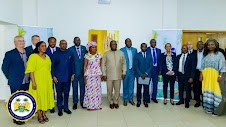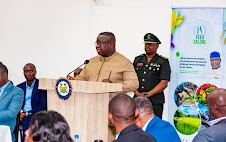In a significant move to boost agricultural development and ensure food security, His Excellency President Dr. Julius Maada Bio announced on Thursday, October 5, 2023, that his Government will allocate up to 10% of the national budget to the Feed Salone Program over the next five years. That announcement was made during a gathering of development partners and stakeholders in the agricultural sector at the New Brookfields Hotel in Freetown.
President Bio emphasized his administration’s commitment to human capital development for sustainable growth, with a specific focus on agriculture through the Feed Salone Program. The initiative aims to ignite agricultural productivity, ensure food security and foster inclusive economic growth, laying the foundation for long-term prosperity in Sierra Leone.
Addressing a diverse audience including representatives from civil society organizations, development partners, the private sector, and farmers, President Bio pointed out Sierra Leone’s vast resources, including abundant land, water, sunshine, and a readily available labour force. He expressed his belief that Sierra Leone should not be a net food importer.
The President highlighted the Government’s efforts to create an enabling environment for private sector investment in agriculture, including a $10 million facility to support the import and distribution of fertilizer, seed production, and agrochemicals. President Bio emphasized the need for a comprehensive transformation of the agriculture sector, particularly in rural areas, to uplift them from economic hardship to prosperity.
Central to the Feed Salone Program is a focus on agricultural industrialization, encompassing not only primary production but also the development of agricultural value chains. President Bio announced the establishment of a Presidential Council on Agriculture, which he will chair, consisting of Government Ministries, Departments and Agencies, the private sector, farmers, academia, research institutions, and civil society. The Council will oversee the successful implementation of the Feed Salone Program.
The Feed Salone initiative has five key objectives: reducing the importation of staple foods like rice, onions, and poultry products; increasing export earnings from cash crops; creating jobs; revitalizing rural areas through agriculture; reducing hunger and malnutrition; and building resilience to economic shocks.
Babatunde Ahonsi, the United Nations Resident Coordinator, praised President Bio’s commitment to agriculture and food security as national priorities. He highlighted the strong link between food security and sustainable development, emphasizing that progress in food security would contribute to achieving all 17 Sustainable Development Goals (SDGs).
Ahonsi commended the ambitious nature of the Feed Salone Strategy, recognizing the challenges posed by resource constraints and global instability. He called for extensive partnerships to ensure effective implementation, involving optimization of resources, capacity building, technical expertise, networking, and collaboration between Government and society.
Dr. Ahonsi concluded by confirming the United Nations’ readiness to support the finalization and better implementation of the Feed Salone program, providing the necessary capacities, technical assistance, and resource partnerships in collaboration with other development partners.





